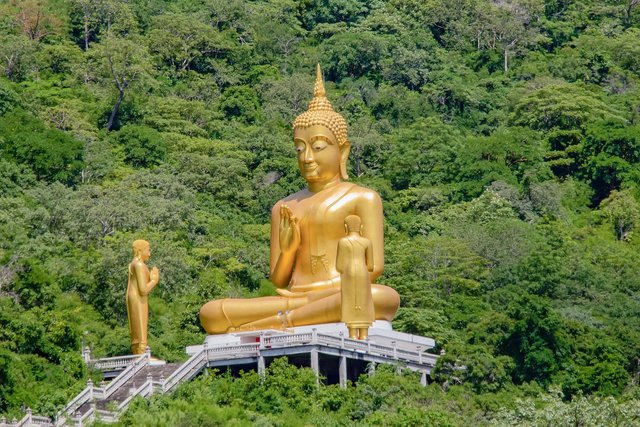
In Buddhism, the most basic things that a lay Buddhist should know is the 5 main precepts. The precepts offer the basic training rules for lay Buddhists to practice everyday, anytime and anywhere. They are not commands or kind of imperatives but only training rules that someone can take them voluntarily. It means whether someone undertake them or not is not a problem. As if someone practice the precepts, he/she will attain good behaviours, good thoughts, good actions, good speech, peacefulness, calmness, and happiness. The following are the 5 main precepts:
- Pāṇātipātā veramaṇī sikkhāpadaṃ samādiyāmi.
I undertake the precepts to refrain from killing.
- Adinnādānā veramaṇī sikkhāpadaṃ samādiyāmi.
I undertake the precepts to refrain from stealing.
- Kāmesumicchācāra veramaṇī sikkhāpadaṃ samādiyāmi.
I undertake the precepts to refrain from any sexual misconduct.
- Musāvādā veramaṇī sikkhāpadaṃ samādiyāmi.
I undertake the precepts to refrain from wrong speech or lying.
- Surāmerayamajjapamādaṭṭhānā veramaṇī sikkhāpadaṃ samādiyāmi.
I undertake the precepts to refrain from any intoxicants and drugs that can reduce consciousness.
The 5 main precepts are a prominent teaching in Buddhism. They are the foundation and the first step of practicing for both lay Buddhist initiation and regular lay Buddhist devotional practices. Anyone, even a non-Buddhist can undertake the precepts because they are kind of reflections to generate good and high quality human beings.The precepts are also known as Pancasila. Pancasila is derived from the word ‘panca’ and ‘sila’. Panca means 5 (five) and sila means moral, principle, behaviour, ethics, etc. The following are the main things of the emerging of Pancasila.
- Shy to commit crimes (hiri).
- Dare to be responsible of what we have done (ottapa).
- Generating calmness inside our mind and heart.
- Generating peacefulness in our environment.
- Maintaining kindness and virtue.
- Eliminate bad behaviours.
- Preventing ourselves to not to do any wrongly actions.
Peacefulness and calmness are the main outcome of practicing Pancasila for both ourselves, other people, and environment.
The manifest of the 5 main precepts is holiness. By practicing Pancasila, we are generating holiness inside our mind, speech, and deed. If we violate it, holiness won’t be developed inside our mind, speech, and deed. Actually, things that can cause us to violate the precepts are evil mind, lust, dissatifaction (lobha), attachment, ignorance (moha), hatred (dosa), and delusion. We should let those things go in order to attain the highest happiness, as known as Nibbana/Nirvana.
People usually consider the Pancasila as a passive action. People usually obey it by only refraining from killing, stealing, sexual misconduct, wrong speech, and intoxicants or drugs. This is the same as doing nothing. As human beings, we should behave wise while considering something. It’s true that the Pancasila states the passive actions but we can develop the passive actions into active actions. The active actions means that while practicing the Pancasila, we can fill our daily life with love (metta), compassion (karuna), sympathy (mudita), and inner calmness (upekkha) by helping people who are suffering or need assistance. This way we can achieve happiness in our life and be born into the heaven afterlife.
The following are the elaborations of the 5 main precepts or Pancasila, as stated in the Pali canon.
There is the case where a certain person, abandoning the taking of life, abstains from the taking of life. He dwells with his rod laid down, his knife laid down, scrupulous, merciful, compassionate for the welfare of all living beings. Abandoning the taking of what is not given, he abstains from taking what is not given. He does not take, in the manner of a thief, things in a village or a wilderness that belong to others and have not been given by them. Abandoning sensual misconduct, he abstains from sensual misconduct. He does not get sexually involved with those who are protected by their mothers, their fathers, their brothers, their sisters, their relatives, or their Dhamma; those with husbands, those who entail punishments, or even those crowned with flowers by another man.
There is the case where a certain person, abandoning false speech, abstains from false speech. When he has been called to a town meeting, a group meeting, a gathering of his relatives, his guild, or of the royalty, if he is asked as a witness, “Come & tell, good man, what you know”: If he doesn’t know, he says, “I don’t know.” If he does know, he says, “I know.” If he hasn’t seen, he says, “I haven’t seen.” If he has seen, he says, “I have seen.” Thus he doesn’t consciously tell a lie for his own sake, for the sake of another, or for the sake of any reward. Abandoning false speech, he abstains from false speech.
And how is one made impure in three ways by bodily action? There is the case where a certain person takes life, is a hunter, bloody-handed, devoted to killing & slaying, showing no mercy to living beings. He takes what is not given. He takes, in the manner of a thief, things in a village or a wilderness that belong to others and have not been given by them. He engages in sensual misconduct. He gets sexually involved with those who are protected by their mothers, their fathers, their brothers, their sisters, their relatives, or their Dhamma; those with husbands, those who entail punishments, or even those crowned with flowers by another man. This is how one is made impure in three ways by bodily action.
If you don’t want to be killed, then don’t kill other sentient beings. If you don’t want to be tortured, the don’t torture other sentient beings. Treat not others in ways that you yourself would find hurtful. Treat others the way you want to be treated.